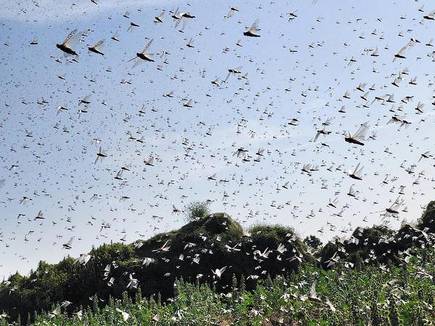
China will send 1,00,000 specially-bred ducks to Pakistan to aid its “iron friend’s” fight against the locust plague, described by Prime Minister Imran Khan as the worst such attack in decades.
Newly hatched ducklings from eastern China’s Zhejiang province will be the frontline weapons in this assault on the insects, billions of which have spread from east Africa to several parts of Pakistan, laying to waste thousands of hectares of farmland.
It could not be immediately verified if these would be the same 1,00,000 ducks stationed as of now.
China has already dispatched a team of experts from the Chinese ministry of agriculture and rural affairs, which is visiting the worst-affected Sindh, Balochistan and Punjab provinces to coordinate control measures, state media reported.
The “disciplined” duck army from China is ready.

Lu Lizhi, a researcher at Zhejiang Academy of Agricultural Sciences, explained why ducks are a dangerous foe to rampant locusts compared to, say, chickens.
“Ducks like to live in groups and are more convenient to manage than chickens. They have stronger vitality, foraging ability, and resistance to cold, which is suitable for survival in the wild,” Lu said.
As it turns out, deploying one duck is equivalent to destroying a family of locusts.
“A chicken can eat 70 locusts a day, and a duck can eat more than 200, which has three times the combat capability. Moreover, ducks eat locusts in a carpet-like manner,” Lu said.
Also, ducks are more disciplined than frogs and birds, which are also natural enemies of locusts, a type of a grasshopper.
The duck “Guo Shao No. 1” from Shaoxing region of Zhejiang will be leading the fight.
Among the Shaoxing ducks, the “mallard duck of ‘ma duck’ is large in size and has strong predation ability, making it the first choice for locust control,” Lu said.
The ‘ma duck’ has an illustrious fighting record.
In 2000, when locusts swarmed Xinjiang, these “duck soldiers” were transported by air from Zhejiang; they were shipped more than 10 times in batches, totaling more than 1,00,000.
Locusts can either be controlled biologically or through pesticides.
From the context of environmental protection, the benefits of biological control are more.
“The former has high killing costs and pesticide residues, and the latter not only has no environmental pollution, but also can repair the biological chain,” Lu added.
After fighting the locusts, the ducks could become food too, the news report said.
“In addition, after the ducklings are grown, the meat is tender, and after the locust eradication ‘retires’, it can become a delicious dish on the table of local residents, bringing economic income,” it said.